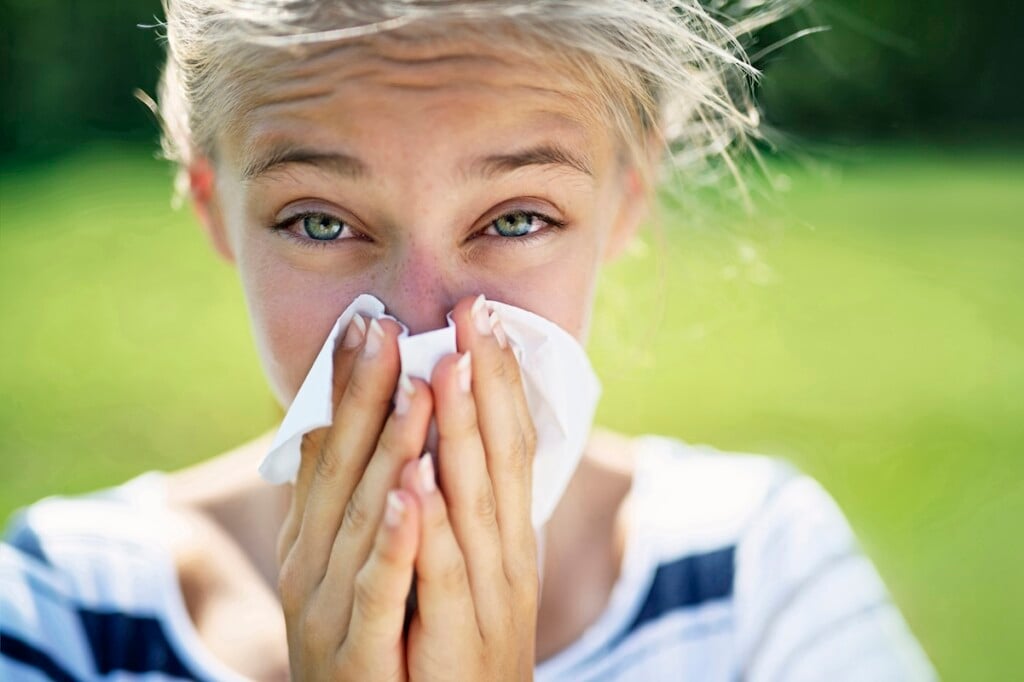Nothing to Sneeze At
When the high pollen count has you reaching for relief, here’s what works—and what doesn’t.

The onset of spring should be an exciting time. The days are longer, the snow is melting and we’re all looking forward to throwing open some windows and letting the air in. But for many Americans the warming trend of these days also means that seasonal allergies are on the march. According to the Allergy and Asthma Foundation of America, as of 2021, 26 percent of adults and 19 percent of children had been diagnosed with seasonal allergies.
Coughing, sneezing, itchy and runny eyes, a tight chest, a sinus headache—these symptoms may seem mundane, but they can be debilitating when they become chronic. “It’s a quality-of-life disease,” says Ellen Sher, M.D., an allergist in Ocean Township. “Except in very extreme circumstances it isn’t lifethreatening, but it can stop people from doing the things they want to do.”
Jun Yang, M.D., an allergist in Tinton Falls, adds: “Some patients can just go and grab over-the-counter medication, and that manages their symptoms. For others, the symptoms truly cause suffering—they miss school, miss work or have other conditions that are related to or made worse by allergies, such as sinus infections or asthma.”
Looking for seasonal-allergy relief? MONMOUTH sat down with Drs. Sher and Yang to discuss some facts, some common misconceptions and some advice on what works:
- Can nasal irrigation help? Saline sprays or nasal irrigation can be a good immediate first step to make yourself feel better. Says Dr. Yang: “The tree pollen you’re allergic to is stuck to your nasal mucosa. If you can wash that allergen out, it’s certainly better than nothing.”
Dr. Sher declares herself “a huge fan of nasal irrigations and sinus rises. There are many ways to do them, as well,” she says. “You can use a neti pot or a NeilMed sinus rinse, and there are even special machines that do it. It’s a great short-term solution.” She adds: “It can also be a good option if someone doesn’t want to take a medication.”
- Is local honey an option? There’s some indication that eating honey, a popular at-home treatment, can introduce pollen allergens into your system and help you build up an immunity to them over time. It’s not a bad theory. “It may work for some patients,” says Dr. Yang, “but it will not work for every patient.”
“There are people who swear by that,” Dr. Sher explains. “However, it is sometimes a double-edged sword. You are intentionally introducing pollen into your system when you do that, because the whole point is that there’s pollen in the honey. It is possible to have a reaction from it. Keep an eye out for that.”
- Will increasing probiotics give relief? What about vitamin C? Recent studies have suggested that a heathy microbiome in the intestinal tract can lower the risk of allergies in general. Though overall health is important, and probiotics help the microbiome in the intestinal tract, both doctors express doubt that increasing them in your diet will help with spring allergy symptoms. While vitamin C is known to prevent inflammation and there may well be some benefit in adding more of it to your diet, neither doctor recommends it specifically for patients. Dr. Yang adds: “It won’t cause harm.”
- Can you predict the allergy season? There is no easy way. “It’s based on our weather predictions, and you know how accurate they can be,” says Dr. Sher with a smile. In New Jersey, allergy season tends to be a two- or three-week period, often the last two weeks of April or the first two weeks of May. The exact time and severity depend on the weather going on around it, which is what makes it so difficult to predict precisely.
Dr. Yang expands on this, saying, “If the season is colder, the trees are not pollinating. But if it gets warm late, that is a different kind of problem. A patient may have been doing OK for months. But, even during a late spring, trees still need to pollinate. That means that when it does get warmer, suddenly everything releases at once and the pollen count spikes very high. That can cause severe symptoms.”
Dr. Sher adds: “Our allergy season has also been increasing steadily over the past 20 to 30 years. We have been having early springs. Patients should prepare for that.”
- Is there a cure for seasonal allergies? Allergies are one of the most common chronic conditions in the United States, but there is hope for those looking to ditch their symptoms for good. Allergy shots, also called immunotherapy, are very appealing to people for this reason. “It’s about tolerance,” explains Dr. Yang. “Allergy shots introduce the allergen, in this case pollen, into a person’s system gradually to increase his or her body’s tolerance to it. With pollen in particular, it works very well.”
Dr. Sher echoes that sentiment, saying: “The shots are effective in about 85 percent of patients who go on them, which is a pretty strong number for any medical therapy.” She continues: “The range of benefit is variable—some people come back and say that they don’t need to take any medications at all anymore. Some people come back and say that they do need to continue taking medications, but they’re still seeing significant improvement.” Dr. Sher also stresses the importance of seeing a board-certified allergist for this treatment to ensure that dosages and dilution are correct and get the maximum benefit from it.
More than anything, both doctors say that patients don’t have to suffer. Some lifestyle changes can ease symptoms in the short term—for instance, staying inside and within air-conditioned environments during the height of pollen season, or taking frequent showers. There are long-term solutions as well, and the treatments currently available are effective.
“People are so used to living with their symptoms that they just don’t know how good they can feel,” Dr. Sher says. “Oftentimes, once we put patients onto adequate treatment, they come back to us and say, ‘I don’t know why I waited so long.’”

